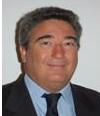Bulloni, Marco Francesco
Marco Francesco Bulloni (1960- ) was born in the Italian town of Sondrio, which is in the north of the country. He spent 16 years travelling with his parents in Asia, during which time he developed an interest in history and archaeology. He has a degree in  Nuclear Engineering, although he works for an insurance company in Milan, where he now lives. Over the past twenty years he has devoted most of his free time to archaeological research.
Nuclear Engineering, although he works for an insurance company in Milan, where he now lives. Over the past twenty years he has devoted most of his free time to archaeological research.
A couple of years ago, Bulloni found himself at the White Sea in North-West Russia, just over a hundred miles south of the Arctic Circle. As he surveyed the topography of the area he was reminded of Plato’s description of Atlantis. After studying the region for two years he claims to have identified all the principal features recorded by Plato; the plain, the Pillars, flora, fauna, circular rings, etc., etc. He further claims that these features all conform to the dimensions given by Plato.
Bulloni also believes that his chosen location in the Solovetsky archipelago is reflected in the famous map of Atlantis by Athanasius Kircher.
When I was first alerted to Bulloni’s book I was somewhat suspicious that it might be a hoax, as his name, when spoken, sounds exactly like ‘baloney’ which is American slang for nonsense. Anyway, as I proceeded to investigate, I read his description of trudging through swamps, climbing a mountain in a snow storm and being attacked by mosquitos, while a Russian website described the area being visited by thousands annually, no doubt using the adequate road system shown in my atlas.
Contrary to Plato’s description, Bulloni’s proposed location does not have high protective mountains to the north and while one annual crop in the region is probably very difficult, two would be impossible. The flora noted by Plato is more consistent with a tropical climate, rather than that of Karelia in 1200 BC (Bulloni’s date). Furthermore, he states that Plato said that Atlantis was still visible, which will come as a surprise to many.
While this is all bad enough, we are now threatened with a second book, Analisi Archeoastronomica delle Isole Solovetsky (Analysis of Archaeostronomy in the Solovetsky Islands). I will be surprised if it is not more baloney.
While this is all bad enough, he published a second book, Analisi Archeoastronomica delle Isole Solovetsky[0987] (Analysis of Archaeoastronomer in the Solovetsky Islands) followed shortly afterwards. A third offer (The Sacred Labyrinth). ing was launched in 2013 – Il Labirinto Sacro[0988] (The Sacred Labyrinth). Bulloni’s first book[712] is entitled Ho scoperto la vera Atlantide (I discovered the real Atlantis) but on his website(b) my online translator confusingly gives me Polar Circle: the discovery of Atlantis.
*(b) https://www.atl-antis.com/ (link broken June 2018)*
